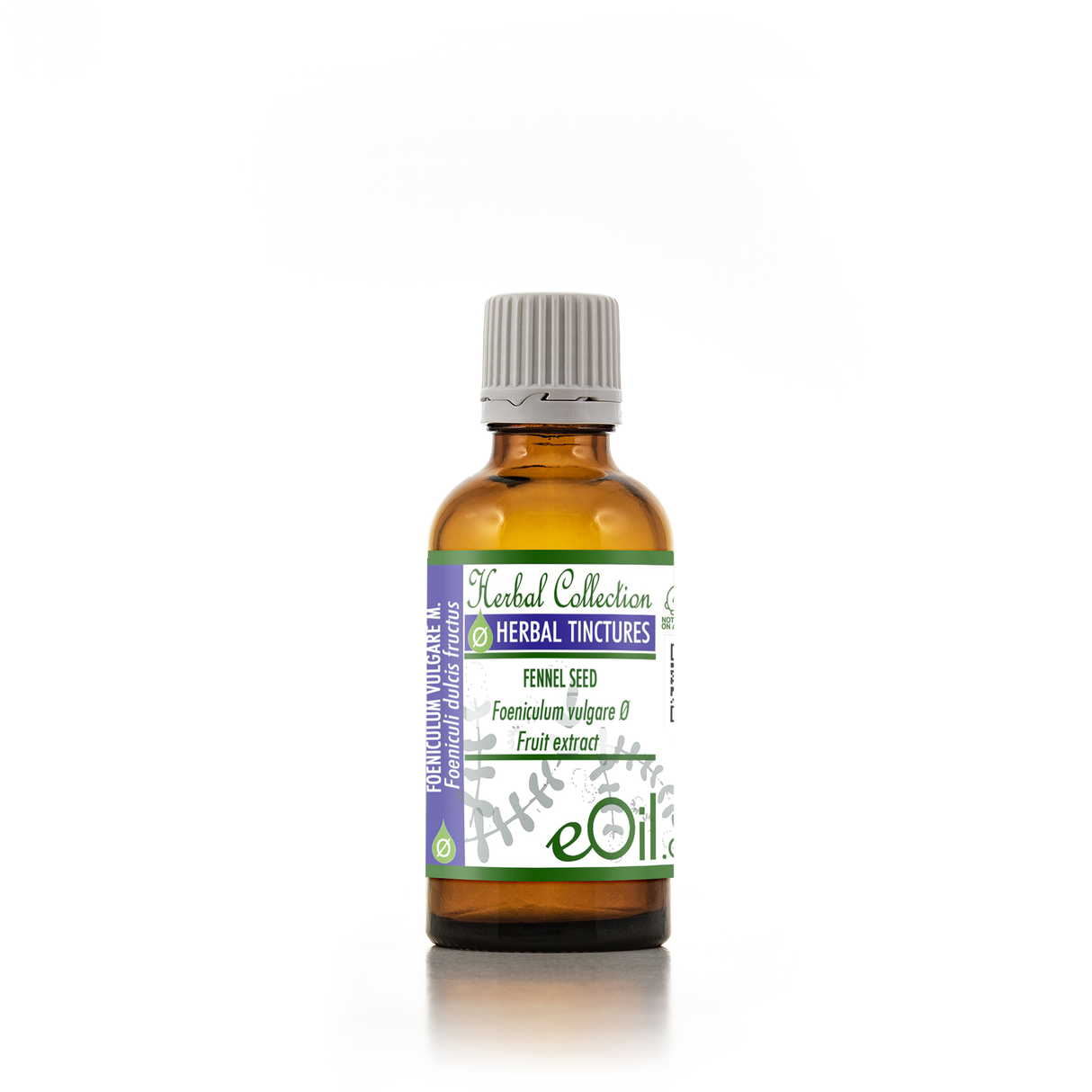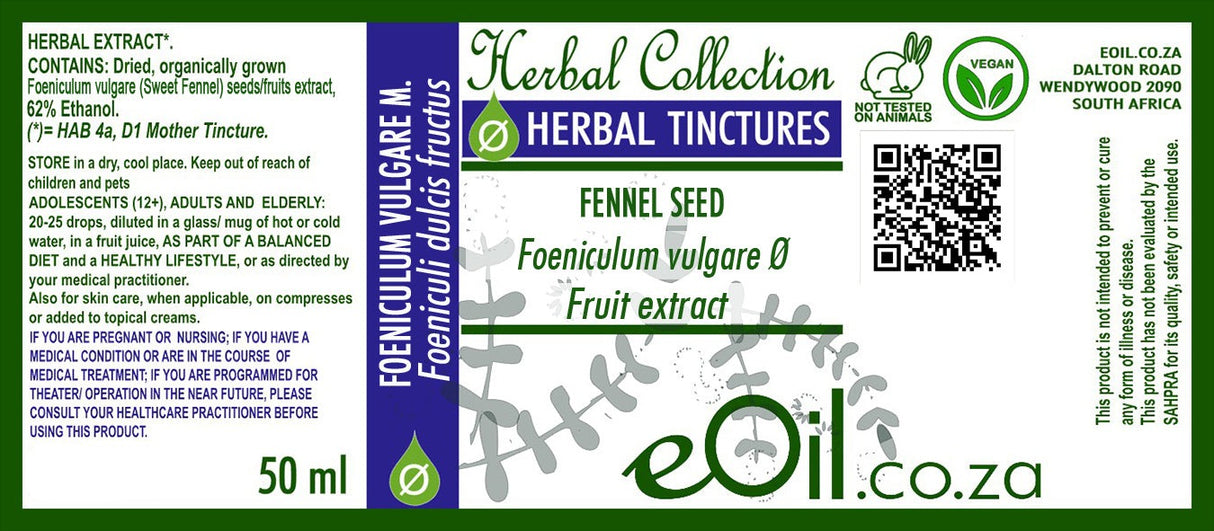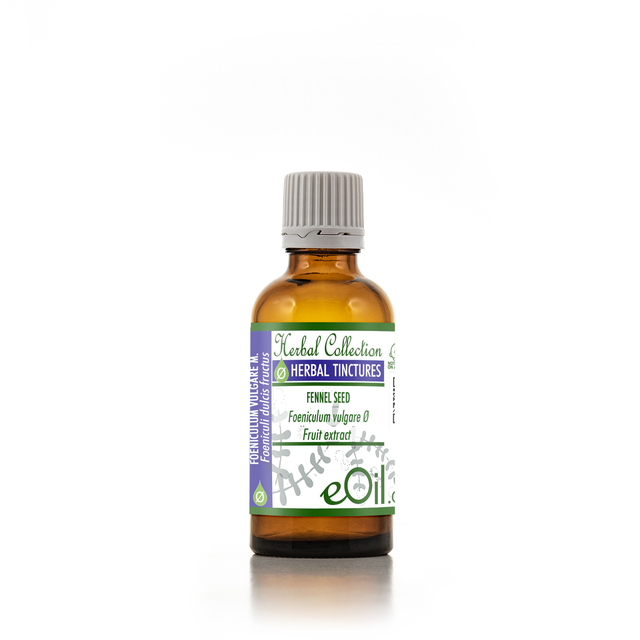Fennel seed - Liquid Herbal Extract
Fennel seed - Liquid Herbal Extract - 50 ML is backordered and will ship as soon as it is back in stock.
Description
Description
Understanding Mother Tinctures & Glycerines
Fennel Seed Liquid Herbal Extract Tincture is a pure extract crafted from the aromatic seeds of Foeniculum vulgare.
Traditionally valued for its soothing, slightly sweet flavor, it gently supports digestion and overall wellness.
This convenient tincture is alcohol-based or alcohol-free, additive-free, and easy to use in daily herbal blends or as a digestive comfort aid
TRADITIONALLY USED FOR
Fennel Seed – Seeds, Tincture & Herbal Capsules (Foeniculum vulgare) – Product Description
What is Fennel Seed?
Fennel seeds are the aromatic, slightly sweet seeds of Foeniculum vulgare. They are widely used in culinary, herbal, and wellness traditions as a famous digestive aid and gentle hormonal and respiratory support.
Fennel also comes as tincture and convenient herbal capsules for diverse health applications.
Fennel Seeds (Whole/Dried)
Traditional & Modern Uses
- Digestive health: Relieves bloating, indigestion, gas, and spasms due to antispasmodic, carminative, and anti-inflammatory compounds (mainly anethole).
- Colic relief: Chewed or made into tea for calming infant colic (under guidance).
- Respiratory health: Supports the clearing of cough and phlegm.
- Lactation: May help stimulate milk production in nursing mothers.
- Natural breath freshener: Chew after meals for fresh breath.
How to Use
- Chew seeds after meals (½–1 teaspoon) for digestion and breath.
- Herbal infusion: Pour boiling water over 1–2 tsp crushed seeds, steep 5–10 minutes, strain, and enjoy after meals.
- Culinary: Use seeds whole or crushed to flavor breads, curries, and baked goods.
Basic COA Information
- Product: Dried fennel seeds (Foeniculum vulgare)
- Origin: South Africa/import; food grade, batch tested for purity
- Key compounds: Anethole, fenchone, fiber, minerals
- COA: Heavy metal and microbial purity tested
Fennel Tincture (Liquid Extract)
Traditional & Modern Uses
- Digestive and antispasmodic: Relieves bloating, gas, and cramps, especially after heavy meals or for colic.
- Hormonal support: May gently ease menstrual and menopausal symptoms.
- Respiratory: Expectorant action supports a clear chest during coughs and colds.
How to Use
- Standard dose: 15–60 drops (about 0.5–2 ml) in a small amount of water, up to 2–3 times daily, or as directed by a healthcare provider.
- Preparation: Traditionally made with fennel seeds soaked in vodka (1:2–1:5 seed:alcohol ratio), left to macerate for 1–4 weeks and strained.
Basic COA Information
- Botanical: Liquid extract of fennel (seeds, food grade alcohol or glycerin)
- Key markers: Anethole content, tested for contaminants
- Free from: Synthetic colors, flavors, preservatives, and major allergens
Fennel Herbal Capsules
Traditional & Modern Uses
- Convenience for digestive comfort: Alleviates indigestion, gas, and mild cramping.
- Hormonal and lactation support
- Respiratory calming: Traditionally used for cough and sore throat.
How to Use
- Typical dosage: 1–2 capsules (often 300–500 mg each, pure fennel seed powder) 1 to 2 times daily after food.
- Course: Suitable for up to 12-week cycles, with a week break before repeat use.
Basic COA Information
- Product: Dried fennel (Foeniculum vulgare) seed powder in vegan capsules
- Free from: Additives, major allergens, synthetic agents
- Food grade, batch tested for purity
Safety and Precautions (All Forms)
- Generally safe for most adults in culinary and therapeutic amounts.
- Not recommended during pregnancy in high/therapeutic doses or for young children without practitioner guidance.
- Allergic reactions possible (rare, usually in those with carrot/celery allergies).
- Fennel may interact with some medications; always consult a healthcare provider if you have allergies, hormone-sensitive conditions, or take chronic medication.
| Feature | Seeds | Tincture | Capsules |
|---|---|---|---|
| Key Actions | Antispasmodic, carminative | Fast-acting digestion, cramps | Digestive, convenient |
| Main Compounds | Anethole, fenchone, fiber | Anethole/flavonoids | Seed powder |
| Typical Dose | ½–1 tsp chew/tea | 15–60 drops, 2–3x/day | 1–2 caps, 1–2x/day |
| Warnings | Caution pregnancy, allergy | As above, avoid excess | As above |
Documentation & certification, visit the quality/certification page on eOil.co.za.
Not intended as a substitute for medical advice. Always consult a practitioner if unsure, on medication, or for persistent symptoms.
INFORMATION
Source : http://www.wikiphyto.org/wiki/Fenugrec
Reference on http://www.wikiphyto.org
Translation in English by Google Translate (go to the page of the source linked | on Chrome cellphones go on the 3 dots on the top right and select translate in your preferred language | on laptop right click your mouse and select option translate when hoovering on the page
plant name
Fenugreek
International Latin denomination
botanical family
Fabaceae subfamily Faboideae (ex - Papilionaceae , ex - Leguminosae )
Description and habitat
- Herbaceous plant 20 to 40 cm high, long petiolate, trifoliate leaves, fairly large, whitish papilionaceous flowers. The fruit is a sickle-shaped pod containing 10 to 20 blocky tawny seeds
- Fenugreek grows in Mediterranean regions and Southwest Asia
History and tradition
- Used to stimulate blood production in classical Arabic medicine (Fleurentin)
Parts used
- seed (seed)
Dosage forms available
- Seed tincture (fruit)
- seed powder
Usual dosages
- Dosage of 1 to 100 grams per day according to studies, in capsules or in food
Composition
Main components of the plant
- Sesquiterpene carbides , alkanes , lactones , alcohol-soluble furan derivative, galactomannan
- Proteins 30%, lipids 7%, rich in Phosphorus
- Many sterols , saponosides ( diosgenin , yamogenin , gitogenin , disocin , graccilin )
- Fenugreekin , peptide ester of a steroidal sapogenin
- 5 spirostanols and 4 furastanols have been isolated
Main components of buds or young shoots
Main components of essential oil
Properties
Plant properties
- The seeds are anti-diabetic [1] , [2] , [3] , [4]
- Decreases post-prandial blood sugar in diabetic dogs and humans, decreases carbohydrate absorption, improves insulin action [5] , decreases liver glucose production [6]
- Lipid-lowering, cholesterol-lowering [7] , [8] , [9]
- Platelet aggregation inhibitor [10]
- Hepatoprotective, protects testicular cells from cadmium damage [11] , and in diabetic rats [12]
- Male Libido Booster [13]
- Neuro-muscular stimulant due to its richness in phosphorus, fenugreek can be classified as an adaptogenic plant
- Increased amount of food intake and appetite [14]
- Anabolic without androgenic effect [15]
- Nephroprotective [16]
- Galactogen [17] , [18]
- Fenugreekine , would have interesting cardiotonic, hypoglycemic, diuretic, antihypertensive properties explaining the use of the plant in Indian medicine
- Diosgenin (applications in the field of semi-synthesis of steroid derivatives) and yamogenin could be extracted industrially
- In studies, the dosage varies from 1 to 100 grams per day, in capsules or in food:
- 1 g in type II diabetics improves glycemic control and decreases insulin resistance
- 100 g / day in type I diabetics increases glucose tolerance and decreases its urinary excretion over 24 hours
- Reduction of LDL, VLDL, triglycerides, total cholesterol with increased HDL and improved endothelial function, reduction of aortic lipid deposits, reduction of intimal thickness, identical in all respects to lovastatin
- Anticancer potential [19]
Bud properties
Properties of essential oil
Directions
Indications of the whole plant (phytotherapy)
- Diabetes, hypercholesterolemia, daily intake of 5 g of fenugreek for 3 months improves glycemic control, decreases HbA1c, leads to weight reduction and an improvement in the lipid profile [20]
- Facilitates weight gain (?), would reduce it in diabetics
- Pro-hormonal (?)
- Milk deficiency
- Hyperthyroidism [21]
- Food of high nutritional value, rich in Magnesium, Calcium, Phosphorus, which contains 20 to 45% of mucilages ( galactomannan ), approximately 30% of proteins, 7% of lipids. It is hypoglycemic, hypocholesterolemic, accelerates healing of gastric ulcers, increases bile secretion
Indications of the bud (gemmotherapy)
Specific indications of essential oil (aromatherapy)
Known or suspected mode of action
- Improves fasting or post-prandial blood glucose (type I or II diabetes) but does not modify it in healthy men
- Pro-hormonal ( diosgenin ?)
Usual formulations
Regulations
- French Pharmacopoeia list A (seed)
- Activity recognized by the German Commission E
Possible side effects and precautions for use
- Avoid in pregnant women, due to the presence of hormonally active saponosides ( diosgenin )
- Possible use to stimulate milk production for a short period of 2 – 3 weeks
- Probable interaction with warfarin [22]
Bibliographic references
- Aller↑ Xue WL, Li XS, Zhang J, Liu YH, Wang ZL, Zhang RJ. Effect of Trigonella foenum-graecum (fenugreek) extract on blood glucose, blood lipid and hemorheological properties in streptozotocin-induced diabetic rats. Asia Pac J Clin Nutr. 2007;16 Suppl 1:422-6. PMID 17392143
- Aller↑ Baquer NZ, Kumar P, Taha A, Kale RK, Cowsik SM, McLean P. Metabolic and molecular action of Trigonella foenum-graecum (fenugreek) and trace metals in experimental diabetic tissues. J Biosci. 2011 Jun;36(2):383-96. PMID 21654091
- Aller↑ Schlienger, JL (2014). Diabetes and herbal medicine: the facts. Metabolic Disease Medicine, 8(1), 101-106.
- Aller↑ Ghedira, K., Goetz, PLJR, & Le Jeune, R. (2010). Fenugreek: Trigonella fœnum-græcum L. (Fabaceae ex. Leguminosae). Phytotherapy, 8(3), 180-184.
- Aller↑ Hannan JM, Ali L, Rokeya B, Khaleque J, Akhter M, Flatt PR, Abdel-Wahab YH. Soluble dietary fiber fraction of Trigonella foenum-graecum (fenugreek) seed improves glucose homeostasis in animal models of type 1 and type 2 diabetes by delaying carbohydrate digestion and absorption, and enhancing insulin action. Br J Nutr. 2007 Mar;97(3):514-21. PMID 17313713
- Aller↑ Hui H, Tang G, Go V L. Hypoglycemic herbs and their action mechanisms. Chin Med. 2009 Jun 12;4:11. PMID 19523223 Full text: [1]
- Aller↑ Petit P, Sauvaire Y, Hillaire-Buys D, Leconte O, Baissac Y, Ponsin G, Ribes G. Steroid saponins from fenugreek seeds: extraction, purification, and pharmacological investigation on feeding behavior and plasma cholesterol. Steroids. 1995, vol. 60, no.10, pp. 674-680. PMID 8539775
- Aller↑ Ali L, Azad Khan AK, Hassan Z, Mosihuzzaman M, Nahar N, Nasreen T, Nur-e-Alam M, Rokeya B. Characterization of the hypoglycemic effects of Trigonella foenum graecum seed. PlantaMed. 1995 Aug;61(4):358-60. PMID 7480183
- Aller↑ Sauvaire, Y., Ribes, G., Baccou, J., & Loubatières-Mariani, MM (1990). Effect of steroidal fenugreek saponins on hypercholesterolemia in diabetic dogs. Reproduction Nutrition Development, 30(1), 129-129.
- Aller↑ Hannan JM, Rokeya B, Faruque O, Nahar N, Mosihuzzaman M, Azad Khan AK, Ali L. Effect of soluble dietary fiber fraction of Trigonella foenum graecum on glycemic, insulinmic, lipidemic and platelet aggregation status of Type 2 diabetic model rats. J Ethnopharmacol. 2003 Sep;88(1):73-7. PMID 12902054
- Aller↑ Arafa MH, Mohammad NS, Atteia HH. Fenugreek seed powder mitigates cadmium-induced testicular damage and hepatotoxicity in male rats. Exp Toxicol Pathol. 2014 Sep;66(7):293-300. doi: 10.1016/j.etp.2014.04.001. PMID 24813645
- Aller↑ Hamden K, Jaouadi B, Carreau S, Aouidet A, El-Fazaa S, Gharbi N, Elfeki A. Potential protective effect on key steroidogenesis and metabolic enzymes and sperm abnormalities by fenugreek steroids in testis and epididymis of surviving diabetic rats. Arch Physiol Biochem. 2010 Jul;116(3):146-55. doi: 10.3109/13813455.2010.486405. PMID 20507258
- Aller↑ Steels E, Rao A, Vitetta L. Physiological aspects of male libido enhanced by standardized Trigonella foenum-graecum extract and mineral formulation. Phytother Res. 2011 Sep;25(9):1294-300. doi: 10.1002/ptr.3360. PMID 21312304
- Aller↑ Petit P, Sauvaire Y, Ponsin G, Manteghetti M, Fave A, Ribes G. Effects of Fenugreek seed extract on feeding behavior in the rat: metabolic-endocrine correlates. Pharmacology, biochemistry and behavior. 1993, vol. 45, no.2, pp. 369-374. PMID 8327543
- Aller↑ Aswar U, Bodhankar SL, Mohan V, Thakurdesai PA. Effect of furostanol glycosides from Trigonella foenum-graecum on the reproductive system of male albino rats. Phytother Res. 2010 Oct;24(10):1482-8. doi: 10.1002/ptr.3129. PMID 20878698
- Aller↑ Azab, AE, Albasha, MO, Elsayed, ASI (2017) Prevention of Nephropathy by Some Natural Sources of Antioxidants. Yangtze Medicine, 1, 235-266. https://doi.org/10.4236/ym.2017.14023
- Aller↑ Penagos Tabares F, Bedoya Jaramillo JV, Ruiz-Cortés ZT. Pharmacological Overview of Galactogogues. Veterinary Medicine International. 2014;2014:602894. doi:10.1155/2014/602894. Full Text
- Aller↑ Mohammed A. Alamer and Ghazi F. Basiouni, 2005. Feeding Effects of Fenugreek Seeds (Trigonella foenum-graecum L.) on Lactation Performance, Some Plasma Constituents and Growth Hormone Level in Goats. Pakistan Journal of Biological Sciences, 8: 1553-1556.
- Aller↑ Al-Daghri NM, Alokail MS, Alkharfy KM, Mohammed AK, Abd-Alrahman SH, Yakout SM, Amer OE, Krishnaswamy S. Fenugreek extract as an inducer of cellular death via autophagy in human T lymphoma Jurkat cells. BMC Complementary and Alternative Medicine 2012, 12:202 (30 October 2012) Abstract Provisional PDF
- Aller↑ Mahjoub, F., Sebai, I., Gammoudi, A., Berriche, O., & Jamoussi, H. (2018, September). Effects of fenugreek (Trigonella foenum graecum) supplementation on the metabolic profile of type 2 diabetics. In Annales d'Endocrinologie (Vol. 79, No. 4, pp. 471-472). Elsevier Masson.
- Aller↑ Tahiliani P, Kar A. The combined effects of Trigonella and Allium extracts in the regulation of hyperthyroidism in rats. Phytomedicine. 2003 Nov;10(8):665-8. PMID 14692727
- Aller↑ Lambert, JP, & Cormier, J. (2001). Potential interaction between warfarin and boldo-fenugreek. Pharmacotherapy, 21(4), 509–512. https://doi.org/10.1592/phco.21.5.509.34492 . PMID 11310527
- Diabetes news - Mr. Ganji Midwife MS islamic Azad University Ghoochan, Korassan, Iran (3rd international congress health, environment and natural products Mashad, Iran)
- Fenugreek and experimental atherosclerosis - MH Pipelzadeh et al. (3rd international congress on health, environment and natural products Mashad, Iran, 25 - 28 sept 2004)
- Ulbricht C, Basch E, Burke D, Cheung L, Ernst E, Giese N, Foppa I, Hammerness P, Hashmi S, Kuo G, et al. Fenugreek (Trigonella foenum-graecum L. Leguminosae): an evidence-based systematic review by the natural standard research collaboration. J Herb Pharmacother. 2007; 7(3-4):143-77. PMID 18928139
CAUTION
Store in a cool, dry place, away from light. Keep tightly closed, away from the reach of Children and pets.
Do not exceed the daily dose.
This product is not intended to prevent or cure any form of illness or disease.
If you are pregnant or nursing ; If you have a medical condition or are in the course of medical treatment ; If you are programmed for theater/operation in the near future, please consult your healthcare practitioner before using this product.
This product cannot replace a varied and balanced diet and a healthy lifestyle.
This product has not been evaluated by the SAHPRA for its quality, safety or intended use.

Fennel seed - Liquid Herbal Extract - 50 ML is backordered and will ship as soon as it is back in stock.





